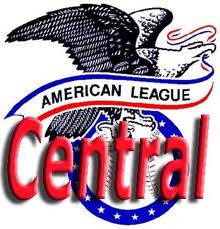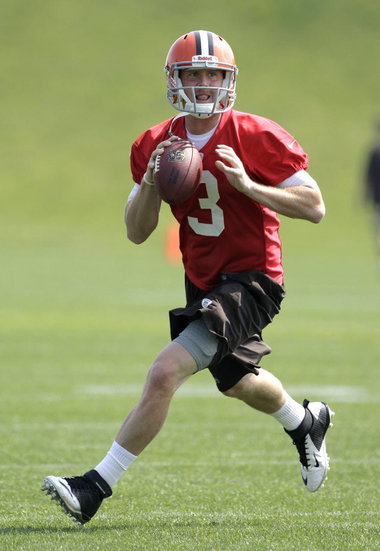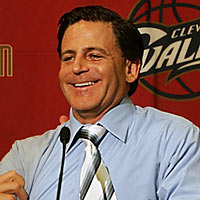Glancing at the baseball standings in early May is usually a fool's game. The reason the baseball season is so lo ng is that it takes a hundred or so games to actually get the full measure of a team's worth. Anything short of that can and often does lead to false impressions. That isn't just a cautious reminder about your team. It's applicable to all teams.
ng is that it takes a hundred or so games to actually get the full measure of a team's worth. Anything short of that can and often does lead to false impressions. That isn't just a cautious reminder about your team. It's applicable to all teams.
Still, avoiding my own advice, it's worth looking at the standings in the American League Central right now where the Indians find themselves in first place by 3 games over the Detroit Tigers. That's the kind of lead that can be lost in the weekend and as we saw last season, a hot start does not necessarily beget a hot finish.
Putting the Indians aside for the moment, though, aren't you at least tempted to draw some conclusions about the division generally? For instance, the Minnesota Twins are already 15 games below .500. Even at an early stage of the season that's too huge of a hole to climb out of in terms of being a pennant contender. They're done.
The Kansas City Royals are done, too. It doesn't matter that they're only 5 games under .500 at the moment. It might as well be their usual 50. The Royals were done when the season started for exactly the same reason they, like the Pittsburgh Pirates, are done as each season starts. They suck.
The franchise is poorly run because it is headed up by a management that secretly doesn't believe they can ever be successful and then goes about its business proving just that. In Kansas City, they labor under the perpetual dread of their circumstances, like Eeyore, knowing that no matter what they do, who they sign, how they train, it's never going to be good enough because all the best looking girls are still going to go out with the guys from Camp Mohawk. So they show up, make a little noise once in awhile but mostly try not to get in anyone's way.
That leaves the race to three teams: the Indians, the White Sox and the Tigers. This is where it does get interesting because at the moment the teams are in a statistical dead heat despite the differences in their records. More time, much more, will be needed to sort it out.
The Tigers looked like a team that could challenge the Texas Rangers for the number of runs scored this year. Yet they have scored exactly the same number of runs as the Indians at the moment, which is actually quite stunning. The White Sox are lagging behind, but only by a few runs.
The Tigers are hitting better than the Indians, the White Sox a little worse and none are hitting particularly well. The difference is that the Indians have a higher on base percentage then the other two, but again the differences aren't particularly statistically significant.
Pitching is somewhat a similar story. White Sox starters have a distinct advantage over those in Cleveland and Detroit, with a collective ERA that's a half run better. But whatever advantage that gives is lost in the bullpen where the Indians clearly have the advantage at the moment.
White Sox relievers, at 38%, are second only to Baltimore in the percentage of inherited runners who end up scoring. Detroit is close behind at 34%. Indians relievers are third best at only 22%. Even more telling is that while the Indians bullpen has been called upon the most to enter games in save situations, they're also converting 78% of those changes, which is fourth in the majors. Tigers relievers have been called upon 36 times in save situations and are only converting 57% of those chances. The White Sox relievers are getting even less chances and still only converting 57% of those chances.
What this all suggests is that like a horse race that's at the quarter pole, the main horses are still too bunched to figure out who will win. The AL Central will be a 3-team race and could easily stay that way for the entire season. The Indians' flaws are more known to the locals but in truth neither Detroit nor Chicago seem to be clearly superior at the moment.
It may be that Detroit eventually finds its footing offensively, but their bullpen will remain suspect for the season unless they find some new arms. It's going to take a lot of runs to cover up for a bullpen that can only be counted on about half the time to hold a lead and get a save. Chicago would seem to need both more hitting and better pitching to stay competitive.
The Indians aren't close to being the best team in the American League this year. In truth, they don't compare all that well with the best teams in the West and the East. But the Central is proving to be weak and that, frankly, is Shapiro's dream scenario. The Indians are never going to be able to go toe to toe with the bullies, but since they currently reside in a division of dipshits at the moment they have a fighting chance. Will the fans notice?
**
 Have you purchased your Brandon Weeden Fat Head wall hanging yet? Maybe they're on back order given all of the run Weeden's been getting from the Plain Dealer lately.
Have you purchased your Brandon Weeden Fat Head wall hanging yet? Maybe they're on back order given all of the run Weeden's been getting from the Plain Dealer lately.
Most certainly Weeden looked good to novice NFL beat writer Dennis Manloff at a rookie mini-camp. Weeden was wearing shorts and a helmet so that in part could be the reason for the gushing analysis of Weeden's rocket arm and pin point precision. It was enough really to send Manloff into a rant about how Weeden shouldn't have Colt McCoy looking over his shoulder when the season gets underway.
I'd talk about how little Manloff seems to understand professional sports and athletes but the call for dumping McCoy in order to clearly signal to Weeden that he's our new man crush in order to soothe his psyche was more than enough proof. If Weeden's is so tender as to be intimidated by the understudy just aching for the star to get sick, then Weeden has absolutely no chance to be a starter in the Arena League, let alone the NFL.
What's surprising though is the complete lack of historical context Manloff and others have while anointing Weeden and clearing his path. Weeden plays for an organization that hasn't had the same person starter at quarterback for 3 straight seasons since Bernie Kosar. They've made so many draft blunders over so many years that it's insane at the moment to give the latest occupiers of the Berea headquarters the benefit of the doubt on any of their picks.
I'm not particularly laying the wood to Tom Heckert or Mike Holmgren, either. It's just that whatever you might think of the players they've drafted thus far, if you're measuring results by such pedestrian measures as wins, then they aren't any better than the previous clowns or the clowns before them or the clowns before them. Remember, too, that Holmgrem is the same guy that deliberately threw away a season by retaining a head coach he didn't respect just because he didn't want to hurt the guy's feelings. In short, until all these fine draft picks of previous years start actually producing more than 4 or 5 wins a season, there's no reason to afford them any more benefit of the doubt then their predecessors.
That's the context that Manloff needs to consider before he starts throwing all in on Weeden without the benefit of having seen him actually perform in one practice with the entire team. Weeden may very well be a franchise savior, but let's wait a little longer for that judgment. In the mean time, let's keep around last year's starter as a hedge, even if he's not your idea of the Answer. He didn't he embarrass the team given the embarrassing group of players that aforementioned Heckert and Holmgren surrounded him with. Something tells me that this team just might need him.
**
 As if Dan Gilbert didn't have enough on his plate with his sparkling new casino, he now is a member of the NBA's newly constituted competition committee. It's an interesting development, to say the least, one he wanted and one he may come to regret.
As if Dan Gilbert didn't have enough on his plate with his sparkling new casino, he now is a member of the NBA's newly constituted competition committee. It's an interesting development, to say the least, one he wanted and one he may come to regret.
The NFL has a competition committee, but it's populated with head coaches and they debate the meaty issues of the day, such as the tuck rule and whether or not the bump and run should be further limited.
Until now, the NBA's competition committee was an unsightly gangly mess of a group of all the league's general managers. Getting them to agree on a lunch menu probably ate up most of the average meeting. Slimming down the committee and putting one of the more vocal owners in the league on it will certainly shake things up. Whether or not it's for the greater good is a whole other matter.
The NBA does have a huge competition problem. Despite the rancorous labor negotiations that gave the owners a little more financial certainty and relief, the new collective bargaining problem didn't solve one of Gilbert's main issues: the fact that the rules are stacked against teams trying to rebuild themselves back into relevance.
Here's Gilbert's main concern. His team has Kyrie Irving, the recently named rookie of the year. Yet Gilbert knows that in a league with the fewest number of players per team, it remains the hardest league in which to turn around a team's fortunes. Gilbert has already let the fans know that even next year's team may not be playoff bound. Indeed, with luck it won't be because in the NBA it's far better for your team's long-term prospects to not make the playoffs then to just make them.
One of the main reasons that it takes so long to graduate to the upper tier of the league is that you're punished with purgatory for just making the playoffs. You're out of the draft lottery and out of the running for the few really good college players that can make an immediate difference to a NBA team.
Most of the things that will keep Gilbert's Cavs on the outer fringes of basketball relevancy can't be changed simply because of a competition committee. He can't, for instance, suddenly make Cleveland a warm weather city where available free agents want to winter, irrespective of how well his casino is climate controlled. He can't change the bizarre, exception-riddled salary cap that keeps the really good potential free agents mostly tethered to their current teams. The time and place for that was at the bargaining table and it didn't happen. In short, absent the overhaul that can only come through difficult labor negotiations, there isn't much that can actually be done to shorten the Cavs 10-year path back toward relevance, Irving notwithstanding.
I have great admiration for Gilbert. He's a guy that can get things done. But for as hard as he works and for as hard has he pushes, I think he's starting to realize that the odds aren't just long, but almost impossible for achieving meaningful change. And when he becomes frustrated with the process, which he will, just hope that the only thing that happens is that he quits the committee or rotates off. Neither the Cavs, its fans nor the city can afford to let Gilbert get fed up with a broken system and take his considerable talents elsewhere, unless it's across the street to Progressive Field or down the road to Cleveland Browns Stadium. In that case, I hope his work on the competition committee breaks his resolve.
**
Apropos to nothing, but this week's question to ponder: When did the NHL playoffs become more compelling viewing than the NBA playoffs?